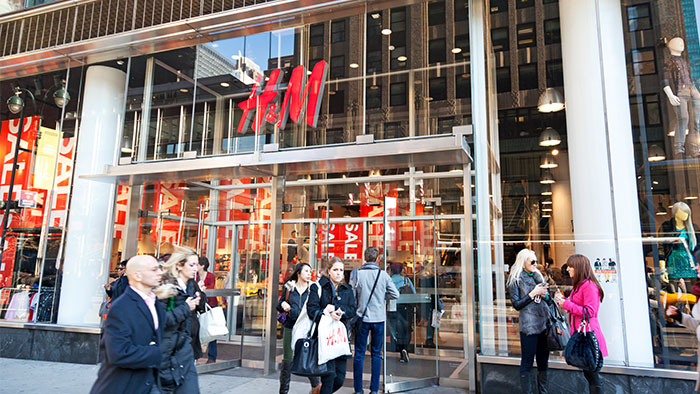H&M Is Closing Exterior Doors To Open Savings
- By [ Erin Hiatt ]
- 09/17/2018
With more than 4,500 stores worldwide, H&M is one of the world's most well-known leaders in fashion for men, women, teenagers and children. After previously keeping many exterior storefront doors propped open, the clothing retailer used a 2015 NYC law as an opportunity to understand if closing the doors to save money and energy would impact their consumer foot traffic.

With more than 4,500 stores worldwide, H&M is one of the world's most well-known leaders in fashion for men, women, teenagers and children. After previously keeping many exterior storefront doors propped open, the clothing retailer used a 2015 NYC law as an opportunity to understand if closing the doors to save money and energy would impact their consumer foot traffic.
The Challenge
Like any retailer, H&M wants customers to feel welcome and excited to enter their stores, and historically, propping exterior doors open was thought of as one way to entice customers in. However, open doors have financial and energy efficiency consequences that are not insignificant. Many retailers are concerned that shutting their doors, though it saves energy, would discourage foot traffic.
The Solution
Under a new campaign and legislation passed in 2015, stores and restaurants in New York City are obligated to keep front doors closed while building air conditioning is running. After its first year in compliance with the law, H&M decided to gain a deeper understanding of the impacts of both energy usage and foot traffic of open versus closed exterior doors. Based on the operational change in New York, H&M began to evaluate its implications on future savings in various US locations.
The Process
The challenge was examined in two ways: one, as an energy and financial savings opportunity and two, as a factor potentially impacting store foot traffic. H&M's North America sustainability team started off by determining the total volume of air that infiltrates the store when doors are left open. By using average weather data for their New York store, they were able to calculate the amount of energy it takes to cool the excess air for one summer. Under the assumption of a two-door store and the electric cost of $0.129/kWh, H&M Energy Specialist Kyle Hopkins was able to estimate a potential savings of roughly $10,000 in annual savings per store with an open exterior door.
To understand the implications for customer shopping, H&M analyzed any changes in foot traffic in New York City stores after the law passed. They were unable to find any discernable change after the city implemented the closed-door law.
With both key results in alignment with H&M's sustainability initiatives, they proceeded with making the business case for a closed-door policy.
The Outcome
- In spring 2016, H&M's senior leadership was presented with the low-cost and low-risk savings from their findings.
- By summer of 2016, the H&M North America President approved a company-wide closed-door policy with special case exceptions
- The H&M energy team collaborated with the marketing department to create a simple, yet informative vinyl sticker to be placed on doors
- H&M ensures that there are both physical and training reminders to keep doors closed
"For H&M, sustainability is an integral part of all that we do and is shown in our business concept of 'fashion and quality at the best price in a sustainable way.' It is important for us to also put that into practice in our stores. Keeping the doors shut and lowering our environmental impact on the planet by conserving energy shows our customers through concrete actions that being sustainable isn't just something we say, it's something we do every day, in every place we operate."
John Ehrnst
- Sales Manager, US
- H&M


